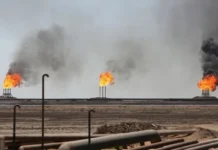Home Savings…Idle Money
Economic 2025/08/19 Dr. Talal Nazim Al-Zuhairi In almost every Iraqi home, there’s a corner dedicated to financial security: a metal box, a secret drawer, or even a plastic bag hidden in a wardrobe.
Millions of dinars are kept at home instead of being circulated through the economy via banks or investments, with all the obvious risks this entails, such as theft, fire, or even loss of money due to any emergency.
This phenomenon, which has become a common behavior, is not merely an old habit or an individual choice. Rather, it reflects a complex economic and social reality with profound repercussions for the
financial system and the national economy.
The primary reason driving Iraqi families to keep their money at home is the lack of trust in banks.
Previous experiences with
delayed salary payments or
disruptions to electronic systems, in addition to the
complex procedures for withdrawals and deposits,
have created a state of chronic anxiety among depositors.
In the mind of the citizen, keeping cash at home ensures immediate access to their funds when needed,
without falling into a cycle of red tape or facing the possibility of accounts being frozen in times of crisis.
However, there is also a near-total absence of safe and transparent investment channels.
The average citizen, especially those with medium or limited incomes, has only two options:
deposit their money in a bank with a weak return that doesn’t keep pace with inflation, or
take the risk of investing in unsecured projects that lack proper research and oversight.
Under this equation, the home becomes more attractive than any financial institution.
When the government announced the salary localization policy,the stated goal was to
integrate a broad segment of employees into the banking system and
facilitate financial transactions through electronic payments and purchases,
while keeping surplus funds in bank accounts rather than withdrawing them in cash.
However, reality has proven that the lack of trust in banks has rendered this policy ineffective.
As soon as salaries are deposited into accounts, the
majority of employees rush to withdraw them in full on the same day,
as if the bank account were merely a temporary stopover.
Money continues to leak out of the banking system as soon as it enters,
re-entering the same household savings cycle.
Thus, the idea of localization has transformed
from a tool for promoting financial inclusion
into a formality that fails to achieve its economic objectives.
The continued withdrawal of funds from the Iraqi banking system and
their continued holding at home
weakens banks’ ability to lend and
puts pressure on the government to meet its obligations.
This could
lead to delayed salaries and
force the Central Bank to print more currency,
causing inflation and
weakening purchasing power.
Successful international experiences (such as those in Turkey and Malaysia) have proven that the
solution begins with
rebuilding trust between citizens and banks by
improving services,
providing incentives to savers, and
expanding electronic payments.
To achieve similar results, Iraq needs to:
digitize government salaries and payments;
launch savings and investment instruments
with attractive and secure returns; and
ensure deposit protection. In addition, it needs to
improve the banking infrastructure and
reduce electronic transaction fees. https://alsabaah.iq/119166-.html
The Value Of Iraq’s Gold Reserves Has Increased.
Economy 2025-08-19 | 625 views An economic observatory announced on Tuesday that the
value of Iraq’s gold reserves rose by 4.76% during the first half of this year, due to gold prices. rising global The observatory said in a statement seen by Sumaria News that “Iraq possesses 162 tons of gold as part of its national reserves,” noting that “the price of a ton of gold was $105 million in January 2025, and gradually rose to $110 million by the end of June 2025.”
He added, “This increase in the price of gold has directly contributed to
raising the value of Iraq’s gold reserves,” stressing that “gold remains one of the most important strategic assets that enhances the country’s financial strength.”
The Observatory noted that “the rise in global gold prices over the past months reflects
fluctuations in global markets and directly impacts the value of national reserves in many countries, including Iraq.”
He explained, “Monitoring gold prices on a regular basis enables Iraq to accurately assess the value of its reserves and make appropriate economic decisions to maintain the stability of the country’s purchasing power.” https://www.alsumaria.tv/news/economy/537713/ارتفاع-قيمة-احتياطي-العراق-من-الذهب
Economists: Public Spending Technology Will Reduce The Budget Deficit
Economic 08/20/2025 Baghdad: The pillar of the emirate In light of the ongoing volatility of crude oil prices in global markets, the government has adopted what is known as the “public spending technique” as a mechanism for managing financial resources and ensuring their optimal allocation.
This technique is based on
planning,
implementing, and
monitoring government spending
to achieve
efficiency and
effectiveness,
align with sustainable development goals, and
meet societal needs.
Alternatives to compensate for the deficiency
The government’s financial advisor, Dr. Mazhar Muhammad Salih, stated that the
instability of global crude oil prices and
their decline to below the price set in Budget Law No. (13) of 2023,
which amounted to $70 per barrel,
forced Iraq to search for alternatives to compensate for the shortfall in revenues. He explained that the escalating trade war between the world’s two largest economies—the United States, the largest oil producer, and China, the largest importer, with 10 million barrels per day— was the primary reason for this decline.
Saleh explained, in his interview with Al-Sabah, that the United States is investing extensively in shale oil fields with a production cost of no less than $58 per barrel at the break-even point, with a production rate of 15 million barrels per day, in addition to strategic storage needs of up to To 23 million barrels.
In contrast, China imports about 10 million barrels per day, the highest import rate in the world. He emphasized that this reality places international markets before “the most difficult geo-economic equation in their history,” which will not stabilize unless a balance is achieved between production cycles and oil assets at a moderate and stable point.
He added that, in light of the above, the Iraqi public finances are working to maximize their revenues
through the time factor in financial collection without delay, by enhancing the government’s unified digital account.
Government collections will be digitally collected for the benefit of the public finances’ cash budget,
ensuring that all government payments, including wages, services, fees, taxes, and market sector revenues, are received via instant digital payments without delay, with the aim of enhancing spending without delay or resorting extensively to bridge financing through borrowing.
Options and alternatives
The Prime Minister’s financial advisor continued that the fiscal policy has set limits on two spending options.
The first is necessary spending, represented by paying salaries, wages, pensions, social welfare, debt services, farmers’ support, and fuel, on the one hand, and proceeding with the basic infrastructure projects approved within the government’s service program, on the other hand.
He added that the second option is expanding deferred operational spending in the event of an increase in oil prices and the return of oil assets to stability at higher price levels, to implement the approved expenditures according to their importance and the importance of their gradualness.
He stressed that it is a successful flexible fiscal policy supported by a strong monetary policy that
maintains stability with monetary guarantees that provide sustainability of financial spending at the ideal minimum without the country being exposed to any economic contraction.
Administrative Control
For his part, Dr. Imad Al-Ani, an economic expert, explained that financial reform efforts should focus on
increasing the efficiency of allocating government resources by strengthening administrative control systems to control and reduce resources allocated to unproductive operational spending, or what is known as “off-budget spending.”
This is what is meant by public spending technology, meaningthe use of modern technology and advanced methods to better distribute public funds by measuring the returns on this spending,
thus shifting funds
from unproductive public spending
to productive spending with economic and social returns that achieve the well-being of society.
Social services
Al-Ani added to Al-Sabah that the public spending technique also means linking the commitment to
providing support for goods and services to the needy groups in particular,
working to improve the level of social services and the method of providing them, in addition to
focusing on human development and infrastructure.
He pointed out that the composition and structure of public spending, not its level, is what is important in the process of reforming public spending, to the extent that the level of public spending is consistent with economic stability. https://alsabaah.iq/119249-.html
Economist: 99.2% Of Crude Oil Revenues Go To Cover Salaries Alone.
Today’s Economy , 10:22 | 298 Baghdad Today – Baghdad Economic expert Nabil Al-Marsoumi confirmed on Tuesday (August 19, 2025) that most crude oil revenues go to cover salaries only, warning that this situation undermines the potential for economic development and limits the provision of basic services to the population.
Al-Marsoumi said in a post on his Facebook account, followed by “Baghdad Today,” that
“oil revenues are almost entirely allocated to cover salaries, according to the financial accounts published by the Ministry of Finance for the first quarter of 2025.
Crude oil export revenues amounted to approximately 45.283 trillion dinars, while
total salaries paid amounted to 44.946 trillion dinars, with a coverage rate of 99.2%.”
He added that these salaries include
employee compensation,
grants and wages,
retirement pensions,
salaries for full-time appointees, and the
social safety net,
warning that this situation undermines the potential for economic development and
limits the provision of basic services to the population.
To address this crisis, the expert outlined two main solutions: the
first is to increase public revenues, whether from oil or non-oil sources, and the second is to reform and restructure the payroll system by addressing private and duplicate salaries, combating corruption, and rationalizing expenditures.
Al-Marsoumi pointed out that if swift action is not taken, the government may be forced to make difficult choices, such as devaluing the dinar or reconsidering government subsidies— decisions that would negatively impact fixed-income earners and the poor. https://baghdadtoday.news/281227-992.html
For current and reliable Iraqi news please visit: https://www.bondladyscorner.com






